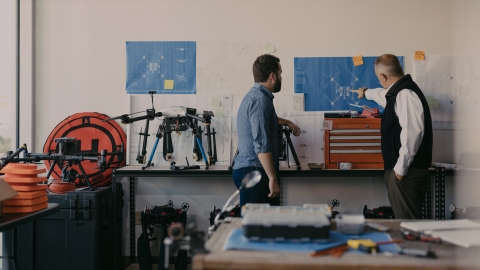So you’ve decided to start using drones in your work. But how do you get started?
Building a drone program will take time and resources, and require devoted personnel to oversee the effort. But it may be worth doing, especially if you would like to leverage drones on a regular basis.
On the other hand, relying on third-party drone service providers (DSPs) means you don’t have to deal with the complications of keeping drones on-site, training pilots, and all the regulatory considerations that come along with their use.
Many companies choose a hybrid approach, keeping some drones on hand for emergencies and last-minute spot checks while hiring drone service providers for more intensive, specialized work, which may require specific skills or specific types of professional drones.
If you are considering building a drone program, here are seven important things to keep in mind.
1. Fleet maintenance
An initial investment will be required to build a drone fleet and acquire extra parts and batteries. It will be important to set up a system to track each battery’s life, since drone batteries need to be stored and maintained following specific protocols. It is also important to track usage for drone hardware to monitor the depreciation of your assets and anticipate maintenance requirements.
2. Regulations
All drone pilots doing commercial work with drones must be certified by the FAA by passing the FAA’s Part 107 test and must fly in compliance with the FAA’s Part 107 rules. Part 107 certification must be renewed every two years.
3. Air space considerations
The national airspace (i.e., anywhere you plan to fly in the U.S.) is controlled by the FAA and not by local or state governments. Before flying you must review the airspace in which you plan to fly and make sure you can fly there. Some airspace, such as the airspace located near an airport, may require special permission. The FAA provides UAS (Uncrewed Aerial Systems) Facility maps where you can conduct airspace research to learn about any restrictions that may be in place in the area where you want to fly.
4. Documentation
Safety standards and checklists will need to be built out as standard operating procedures (SOPs), which include things like training, maintaining piloting skills, rules for logging flights, or the routine inspection of drone hardware components and operational capabilities.
5. Data management
Drones collect lots of data, resulting in the need for a data management system. Data management is usually done on paid third-party software, which can help with not only storing data your drones collect but also with processing that data into outputs like 3D models, as well as with operational tracking like logging flights and tracking your drone operations in general.
6. Insurance
Drones add a new level of operational risk to your work, which means that drone insurance is an important part of building a drone program. On the other hand, some commercial insurance providers such as AXA XL will provide reductions in insurance premiums to construction companies that implement technologies such as drones, since they reduce risk by doing things like inspecting areas that would otherwise require an employee to place themselves in a dangerous situation, such as working at height on scaffolding.
7. Weather monitoring and scheduling
You may have done all the work above and be ready to fly—but the weather could have other plans. As part of building a drone program, it’s important to have a team lead devoted to mission planning for the day of the flight, who is responsible for airspace research and for making weather viability and safety determinations.
What’s Next?
As you can see, if you want to get started with using drones in your work the easiest path forward may be to consider partnering with a company that provides drone services.
DSPs can help not only with collecting data by drone, but also with FAA airspace authorization requests, automated flight planning, pilot scheduling, and weather monitoring. DSPs also carry their own insurance, reducing liability and complexity for you.
Some construction companies partner with DSPs as they start to build out their own drone programs, allowing them to capitalize on the benefits drones provide immediately.
Learn about the construction drone services DroneUp provides here.
